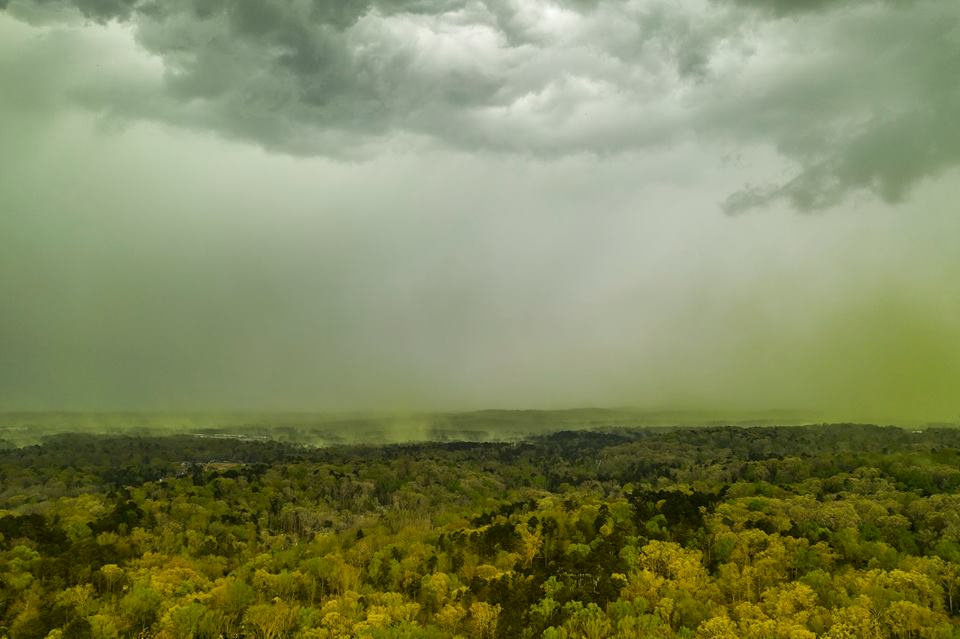A dense, green cloud of pollen was photographed hanging above the city of Durham, N.C., Monday morning, making sufferers of seasonal allergies cringe.

The pictures were taken by photographer Jeremy Gilchrist, who used a drone to snap aerial shots of the pollen blanketing the city.
Gilchrist posted the photos on Facebook, calling it ‘Pollmageddon.’
“No tricks here,” he wrote. “Yes you are looking at a green haze made up of tree pollen from the pines of central NC!”
Gilchrist captured the photos during a spike in pollen concentrations in the area.
According to a pollen report from North Carolina’s Division of Air Quality, the pollen severity was set to “very high” in the nearby city of Raleigh for Sunday and Monday.
When is allergy season in Canada?
In Canada, the photos are a stark reminder that allergy season has arrived for some.
However, according to Global News Chief Meteorologist Anthony Farnell, when allergy season begins is dependent on geography.
“Because Canada is so big and we have so many different climates, allergy season can start as early as February in B.C., and as late as June across the north,” Farnell explained.
Farnell says allergy season occurs in three stages.
“The first state of allergy season in tree pollen and this is about to begin across southern Ontario,” Farnell explained.
WATCH: What does pollen look like? Man with a backhoe will show you

Farnell says it will then spread north, but could be delayed by two or three weeks due to the cool spring and frequent snow events.
“Unfortunately this delays the season and doesn’t necessarily shorten it,” Farnell said.
According to Farnell, grass allergy season occurs next.
“Grass allergies have already started in places like Vancouver, but the frequent rain keeps levels lower than in the prairies and eastern Canada,” he said. “As the grass turns green in late April and May, the grass allergy season begins.”
Next up is ragweed, but Farnell says this only becomes a problem later in August as the plants reach the flowering stage.
WATCH: Ask the Doctor: Dealing with seasonal allergies in Edmonton

According to Farnell, from Ontario through Atlantic Canada, this spring is shaping up to be very wet, which will limit pollen — at least for the next month.
“If you suffer from allergies, you should actually root for frequent showers,” Farnell explained. “This is Mother Nature’s way of cleaning the atmosphere.”
Mitigating seasonal allergy symptoms
Once allergy season is in full swing, there are a few ways people who experience symptoms can mitigate their suffering.
Dr. Harold Kim is the president of the Canadian Society of Allergy and Clinical Immunology. He says if you believe you are experiencing the symptoms of seasonal allergies, the first step is to see an allergist to identify the allergen causing the symptoms.
WATCH: Seeking relief during allergy season

And while the symptoms of seasonal allergies are sometimes confused with viral infections such as a cold or flu, Kim says there are several hints that help to differentiate.
“A cold will usually only last for five to seven days,” Kim said. “And most people with a viral infection will feel unwell on top of nasal and eye symptoms.”
According to Kim, people who suffer from seasonal allergies are often allergic to other things as well, such as pets.
The symptoms of seasonal allergies are often treatable, Kim said. “The first thing we recommend is non-sedative antihistamines.”
If those are not effective, Kim says prescription nasal steroids or eye drops may be prescribed.
In some cases, Kim says, if a patient is experiencing severe symptoms or other medications aren’t working, allergen immunotherapy may be offered.
WATCH: Spring sniffles: Allergies or the common cold?

According to Kim, allergen immunotherapy options, including an under-the-tongue tablet, are now available in Canada for dust mites, grass and ragweed.
As allergy season begins, Kim says another thing people can do is keep their windows closed.
“We don’t want people to decrease activity,” Kim said. “But it helps to keep allergens outside.”
- Buzz kill? Gen Z less interested in coffee than older Canadians, survey shows
- Naloxone-resistant street drug linked to 9 deaths in Eastern Canada seized in Alberta
- Bird flu risk to humans an ‘enormous concern,’ WHO says. Here’s what to know
- ‘She gets to be 10’: Ontario child’s heart donated to girl the same age






Comments